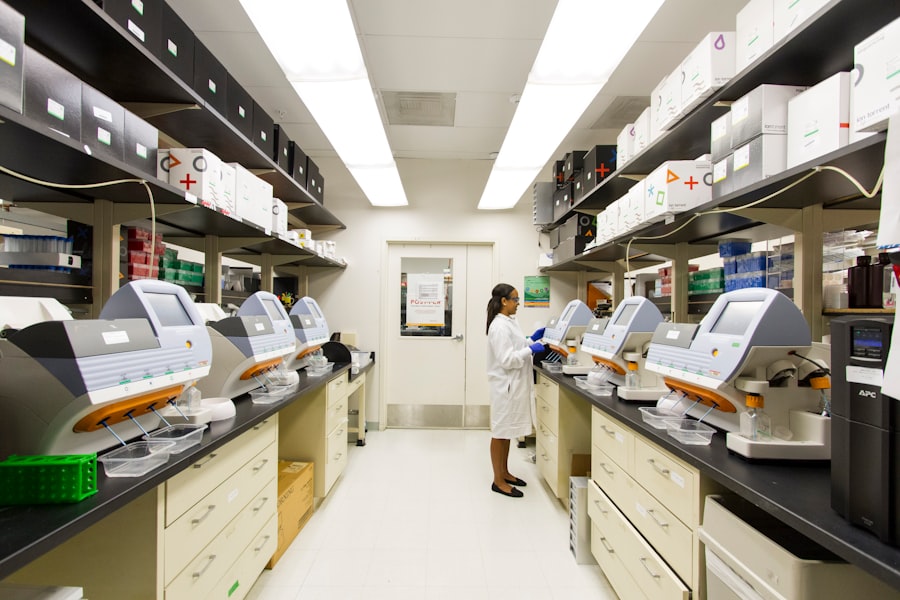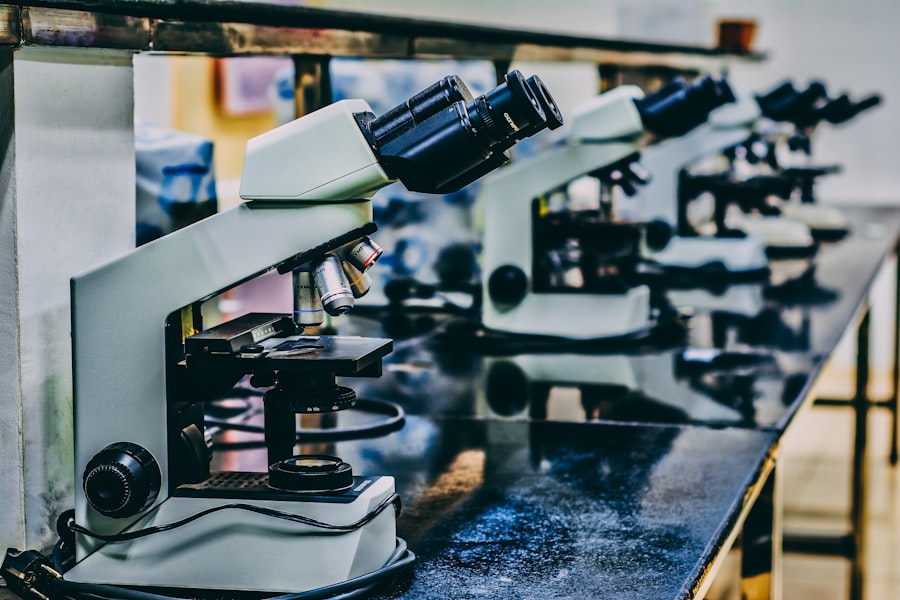Biotechnology has emerged as a transformative force in the field of drug development, revolutionizing the way new therapeutics are discovered, developed, and brought to market. This interdisciplinary domain combines biological sciences with technology to manipulate living organisms or their components for the purpose of creating products that improve human health. The integration of biotechnology into drug development has led to significant advancements, enabling the creation of novel therapies that were previously unimaginable.
From monoclonal antibodies to gene therapies, biotechnology has expanded the arsenal of tools available to researchers and clinicians, allowing for more effective treatments for a wide range of diseases. The historical context of biotechnology in drug development can be traced back to the early 20th century, but it gained significant momentum in the 1970s with the advent of recombinant DNA technology. This breakthrough allowed scientists to isolate and manipulate genes, leading to the production of insulin and other vital proteins through genetically modified organisms.
As a result, biotechnology has not only enhanced our understanding of disease mechanisms but has also paved the way for innovative therapeutic strategies that target specific biological pathways. The ongoing evolution of biotechnology continues to shape the landscape of drug development, making it an essential area of focus for researchers, pharmaceutical companies, and healthcare providers alike.
Key Takeaways
- Biotechnology plays a crucial role in drug development by utilizing living organisms, cells, and biological systems to create new drugs and therapies.
- Advancements in biotechnology techniques, such as CRISPR gene editing and monoclonal antibody technology, have revolutionized drug development by enabling more precise and targeted approaches.
- Biotechnology has significantly impacted targeted drug therapies by allowing for the development of drugs that specifically target the underlying molecular mechanisms of diseases, leading to more effective treatments with fewer side effects.
- Personalized medicine has been greatly influenced by biotechnology, as it allows for the customization of treatments based on an individual’s genetic makeup, leading to more tailored and effective therapies.
- Biotechnology has improved drug safety and efficacy by enabling the development of more accurate preclinical testing methods and the ability to monitor and predict potential adverse effects more effectively.
Advancements in Biotechnology Techniques
The landscape of biotechnology techniques has evolved dramatically over the past few decades, driven by rapid advancements in molecular biology, genomics, and bioinformatics. Techniques such as CRISPR-Cas9 gene editing have revolutionized the ability to modify genetic material with unprecedented precision. This technology allows researchers to target specific genes associated with diseases, offering potential cures for genetic disorders that were once deemed untreatable.
The ability to edit genes not only enhances our understanding of disease pathology but also opens new avenues for developing targeted therapies that can address the root causes of illnesses. In addition to gene editing, advancements in high-throughput screening technologies have accelerated the drug discovery process. These techniques enable researchers to rapidly test thousands of compounds against specific biological targets, significantly reducing the time and cost associated with traditional drug development methods.
Coupled with artificial intelligence and machine learning algorithms, high-throughput screening can identify promising drug candidates more efficiently than ever before. Furthermore, innovations in biomanufacturing processes have improved the scalability and cost-effectiveness of producing biopharmaceuticals, ensuring that these life-saving drugs can be made available to patients in need.
Biotechnology’s Impact on Targeted Drug Therapies

One of the most significant contributions of biotechnology to drug development is the emergence of targeted drug therapies. Unlike traditional treatments that often take a one-size-fits-all approach, targeted therapies are designed to interact with specific molecular targets associated with a disease. This precision medicine approach has been particularly impactful in oncology, where therapies such as trastuzumab (Herceptin) and imatinib (Gleevec) have demonstrated remarkable efficacy against certain types of cancer by specifically targeting cancer cells while sparing healthy tissues.
The success of targeted therapies is largely attributed to advancements in biomarker discovery, which allows for the identification of patients who are most likely to benefit from a particular treatment. For instance, the identification of HER2 overexpression in breast cancer patients has led to the development of HER2-targeted therapies that significantly improve patient outcomes. Moreover, biotechnology has facilitated the development of companion diagnostics—tests that help determine whether a patient is suitable for a specific targeted therapy—further enhancing the precision of treatment strategies.
As research continues to uncover new molecular targets and biomarkers, the potential for developing more effective targeted therapies will only expand.
The Role of Biotechnology in Personalized Medicine
Personalized medicine represents a paradigm shift in healthcare, moving away from generalized treatment approaches toward tailored therapies based on individual patient characteristics. Biotechnology plays a crucial role in this evolution by providing tools and methodologies that enable a deeper understanding of genetic, environmental, and lifestyle factors influencing health outcomes. By leveraging genomic sequencing technologies and bioinformatics, healthcare providers can now analyze a patient’s unique genetic makeup to inform treatment decisions.
For example, pharmacogenomics—the study of how genes affect an individual’s response to drugs—has become an integral part of personalized medicine. By understanding how genetic variations influence drug metabolism and efficacy, clinicians can prescribe medications that are more likely to be effective for specific patients while minimizing adverse effects. This approach not only enhances treatment outcomes but also reduces healthcare costs associated with trial-and-error prescribing.
As biotechnology continues to advance, the integration of personalized medicine into routine clinical practice will become increasingly feasible, leading to more effective and individualized treatment strategies.
Biotechnology’s Influence on Drug Safety and Efficacy
Ensuring drug safety and efficacy is paramount in drug development, and biotechnology has significantly enhanced our ability to assess these critical factors. The use of biotechnological methods allows for more sophisticated preclinical testing models that better mimic human physiology compared to traditional animal models. For instance, organ-on-a-chip technology enables researchers to create microenvironments that replicate human organ systems, providing valuable insights into how drugs will behave in vivo before they reach clinical trials.
Moreover, biotechnology has facilitated the development of advanced analytical techniques for monitoring drug safety during clinical trials. Techniques such as mass spectrometry and high-resolution imaging allow for real-time assessment of drug distribution and metabolism within the body. This level of detail not only helps identify potential safety concerns early in the development process but also provides data that can be used to optimize dosing regimens and improve therapeutic outcomes.
As regulatory agencies increasingly demand robust safety data, biotechnology’s contributions will be essential in meeting these requirements.
The Future of Drug Development with Biotechnology

The future of drug development is poised for further transformation through ongoing advancements in biotechnology. Emerging technologies such as synthetic biology hold great promise for creating novel therapeutic agents by engineering microorganisms or cells to produce complex biomolecules. This approach could lead to breakthroughs in vaccine development, regenerative medicine, and even organ transplantation by enabling the production of bioengineered tissues or organs tailored to individual patients.
Additionally, the integration of artificial intelligence and machine learning into drug discovery processes is expected to accelerate the identification of new drug candidates significantly. By analyzing vast datasets from genomic studies, clinical trials, and real-world evidence, AI algorithms can uncover hidden patterns that inform drug design and optimize clinical trial designs. As these technologies continue to evolve, they will enhance our ability to develop innovative therapies that address unmet medical needs more efficiently than ever before.
Ethical and Regulatory Considerations in Biotechnology Drug Development
As biotechnology continues to advance at a rapid pace, ethical and regulatory considerations have become increasingly important in drug development. The manipulation of genetic material raises profound ethical questions regarding consent, privacy, and potential long-term consequences for individuals and populations. For instance, gene editing technologies like CRISPR have sparked debates about their use in human embryos and the implications for future generations.
Regulatory frameworks must evolve alongside these technologies to ensure that ethical standards are upheld while fostering innovation. Regulatory agencies such as the U.S. Food and Drug Administration (FDA) play a critical role in overseeing biopharmaceutical development.
The complexity of biotechnological products necessitates rigorous evaluation processes that assess not only safety and efficacy but also manufacturing practices and quality control measures. As new biotechnologies emerge, regulatory bodies must adapt their guidelines to address unique challenges while ensuring public safety. Striking a balance between encouraging innovation and maintaining stringent oversight will be essential for fostering trust in biotechnology-driven therapies.
Challenges and Opportunities in Biotechnology Drug Development
Despite its many advantages, biotechnology drug development is not without challenges. One significant hurdle is the high cost associated with research and development (R&D), which can exceed billions of dollars for a single new drug. The complexity of biopharmaceuticals often requires extensive preclinical studies and lengthy clinical trials before reaching market approval.
Additionally, navigating the regulatory landscape can be daunting for biotech companies, particularly smaller firms with limited resources. However, these challenges also present opportunities for innovation and collaboration within the industry. Public-private partnerships can facilitate funding for R&D initiatives while fostering knowledge exchange between academia and industry.
Furthermore, advancements in technology are continually lowering barriers to entry for biotech startups, enabling them to develop novel therapies more efficiently. As the field matures, addressing these challenges through collaboration and innovation will be crucial for unlocking the full potential of biotechnology in drug development and improving patient outcomes worldwide.
Unfortunately, none of the links provided directly relate to the topic of how biotechnology is revolutionizing drug development. However, for those interested in the broader context of technology and its applications, you might find insights on technological advancements and their implications by exploring other tech-related topics. For instance, understanding the criteria for choosing a VPS hosting provider could be indirectly useful for those managing biotechnological data or drug development simulations online. You can read more about choosing a VPS hosting provider in 2023 here.
FAQs
What is biotechnology?
Biotechnology is the use of living organisms or their products to modify or improve human health, agriculture, and the environment.
How is biotechnology revolutionizing drug development?
Biotechnology is revolutionizing drug development by allowing for the creation of more targeted and personalized treatments, as well as streamlining the drug discovery and development process.
What are some examples of biotechnology in drug development?
Examples of biotechnology in drug development include the use of genetic engineering to create biologic drugs, the development of personalized medicine based on genetic testing, and the use of advanced analytics and data science to identify new drug targets.
What are the benefits of biotechnology in drug development?
The benefits of biotechnology in drug development include the ability to create more effective and targeted treatments, reduce the time and cost of drug development, and improve patient outcomes through personalized medicine.
What are some challenges of biotechnology in drug development?
Challenges of biotechnology in drug development include ethical considerations around genetic testing and personalized medicine, as well as the need for continued investment in research and development to fully realize the potential of biotechnology in drug development.

